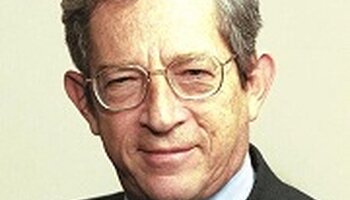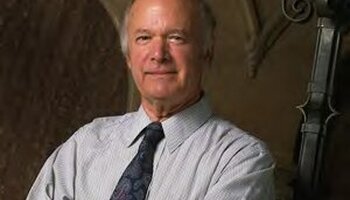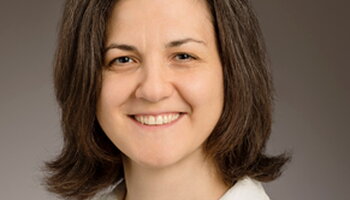Written in 2004 by Mike Lehman, from archival sources
Cold War Dilemmas & the Origins of ACDIS
The Program in Arms Control, Disarmament, and International Security (ACDIS) of the University of Illinois at Urbana-Champaign began in 1978 following nearly a decade of discussion among faculty. The University's faculty wanted to build on its tradition of contributions to ways to limit or avoid the costs of war in the nuclear age that began with Professor Charles Osgood. His research focused on strategies for conducting arms control negotiations. Osgood's 1962 monograph, An lternative to War or Surrender, described a strategy of Graduated and Reciprocated Initiative in Tension Reduction (GRIT).
Addressing the paradox presented by vast numbers of nuclear weapons, acquired in a quest for national security but creating an increasingly less secure world, Osgood's GRIT strategy served as a basis for unwinding the Cold War security dilemma by suggesting that a policy of unilateral moves to defuse tension could invite reciprocal moves by an opponent. This pioneering work continues to be cited in international security courses at many universities.
Beginning in 1975, the discussions of Arthur Chilton, Professor of Nuclear Engineering, with Stephen Cohen and Edward Kolodziej of the Department of Political Science provided the initial impetus for the founding of what was first known as the Office of Arms Control, Disarmament, and International Security. Chilton was a 1939 graduate of the U.S. Naval Academy, rising to the rank of captain. He joined the University faculty in 1962 after his retirement from military service, where his international reputation as a nuclear engineer designing radiation shielding continued to grow. Challenging his peers to work with him in creating a multidisciplinary institute to address the complexities of the Cold War security dilemma, Chilton's idea merged science and scholarship to create a campus-wide program dedicated to studying the country's most pressing peace and security problems.
Chilton believed that the university had to be engaged in the great issues of the day and that it had a duty to educate all thoughtful citizens who needed an understanding of the threat that mankind faced from an uncontrolled arms race. Chilton's standards of academic rigor and of open and non-partisan inquiry became standards of ACDIS. His recognition that problems of war and peace went beyond policy and technology to philosophical, moral, and historical issues saw expression in the interdisciplinary structure of ACDIS.
ACDIS received initial support from the Office of International Programs and Studies (IPS), the Military Education Council, and the Department of Political Science, in addition to the School of Social Sciences and the College of Engineering. Chilton's initial proposal was catalyzed by the Ford Foundation's solicitation of proposals in 1977 for grants to universities in the U.S. and Europe to create arms control centers. The University of Illinois, despite failing to land one of these grants, moved ahead anyway, starting ACDIS in order to enhance education, research, and public discussion in the following areas:
• political and technological issues related to international security
• efforts to control and reduce nuclear and conventional weapons
• historical and contemporary factors which lead to war
• means of achieving and enhancing peace
• economic, cultural, and ethical dimensions of war and peace
Recognizing that policy solutions to conflict are the province of no single discipline, ACDIS drew on the strengths of a multidisciplinary approach that brought together faculty from areas as diverse as political science, physics, Asian studies, law, philosophy, and anthropology.
Specifically rejecting partisanship, the faculty associated with ACDIS refused to confine the program to any particular ideological or methodological path as it sought to understand the relationship of modern technology and science to nuclear and conventional weapons development and proliferation, the growth of regional security systems, and the process of acquiring, distributing and disseminating conventional weapons.
Addressing the paradox presented by vast numbers of nuclear weapons, acquired in a quest for national security but creating an increasingly less secure world, Osgood's GRIT strategy served as a basis for unwinding the Cold War security dilemma by suggesting that a policy of unilateral moves to defuse tension could invite reciprocal moves by an opponent. This pioneering work continues to be cited in international security courses at many universities.
Beginning in 1975, the discussions of Arthur Chilton, Professor of Nuclear Engineering, with Stephen Cohen and Edward Kolodziej of the Department of Political Science provided the initial impetus for the founding of what was first known as the Office of Arms Control, Disarmament, and International Security. Chilton was a 1939 graduate of the U.S. Naval Academy, rising to the rank of captain. He joined the University faculty in 1962 after his retirement from military service, where his international reputation as a nuclear engineer designing radiation shielding continued to grow. Challenging his peers to work with him in creating a multidisciplinary institute to address the complexities of the Cold War security dilemma, Chilton's idea merged science and scholarship to create a campus-wide program dedicated to studying the country's most pressing peace and security problems.
Chilton believed that the university had to be engaged in the great issues of the day and that it had a duty to educate all thoughtful citizens who needed an understanding of the threat that mankind faced from an uncontrolled arms race. Chilton's standards of academic rigor and of open and non-partisan inquiry became standards of ACDIS. His recognition that problems of war and peace went beyond policy and technology to philosophical, moral, and historical issues saw expression in the interdisciplinary structure of ACDIS.
ACDIS received initial support from the Office of International Programs and Studies (IPS), the Military Education Council, and the Department of Political Science, in addition to the School of Social Sciences and the College of Engineering. Chilton's initial proposal was catalyzed by the Ford Foundation's solicitation of proposals in 1977 for grants to universities in the U.S. and Europe to create arms control centers. The University of Illinois, despite failing to land one of these grants, moved ahead anyway, starting ACDIS in order to enhance education, research, and public discussion in the following areas:
• political and technological issues related to international security
• efforts to control and reduce nuclear and conventional weapons
• historical and contemporary factors which lead to war
• means of achieving and enhancing peace
• economic, cultural, and ethical dimensions of war and peace
Recognizing that policy solutions to conflict are the province of no single discipline, ACDIS drew on the strengths of a multidisciplinary approach that brought together faculty from areas as diverse as political science, physics, Asian studies, law, philosophy, and anthropology.
Specifically rejecting partisanship, the faculty associated with ACDIS refused to confine the program to any particular ideological or methodological path as it sought to understand the relationship of modern technology and science to nuclear and conventional weapons development and proliferation, the growth of regional security systems, and the process of acquiring, distributing and disseminating conventional weapons.
Risks of the Nuclear Age & ACDIS Expansion
ACDIS grew rapidly; from an initial mailing list of slightly over forty, its monthly Bulletin reached a circulation of 300 by 1983. By then, some 150 faculty members participated directly in its program. Initially, Chilton, Cohen, and Kolodziej shared the directorship of ACDIS as an overload to their other academic duties—as did the other scholars involved in the program—a situation that demonstrated both the deep concern of faculty about the Cold War and the limited funding available. At first, the Ford Foundation Interdisciplinary Seminar for faculty was the main focus of scholarship at ACDIS, but the program quickly expanded to offer a variety of graduate and undergraduate courses in association with different departments, building on the academic expertise offered by each discipline. Beginning in 1978, much of this work has been published in a series of more than 175 Occasional Papers by some 100 authors, which continue to provide scholarly, in-depth examinations of specific problems.
In 1983, Professor Edward Kolodziej (Political Science) became sole director on a part-time basis as ACDIS became an independent unit within IPS; the U.S. Air Force sent the first in a long line of field-grade officers (typically, majors or lieutenant colonels) to serve one-year assignments as Air Force fellows while doing research at the University; and the program began attracting increasing levels of funding from the MacArthur and Ford Foundations. For every dollar of direct University support, ACDIS drew four dollars in outside funding. Between 1978 and 1986, ACDIS projects received more than a million dollars in funding, not including internal support from the university and its various departments through overload contributions of their faculty. Initiated as a reading room for journals, the ACDIS Library began as a supplement to the University Main Library's arms control resources, which were cataloged by its political science bibliographer. The program placed special emphasis on regional security issues, primarily Europe and South Asia, and on technological support for arms control agreements.
In 1986, Professor Jeremiah Sullivan (Physics) became the first paid, part-time director of ACDIS. The success of the program was already straining the limited facilities available in the offices it shared with IPS in Davenport Hall. ACDIS was an early adopter of computerized word processing, but these efficiencies were somewhat offset by the printers that loudly banged out copies in close proximity to research underway in the space shared with the library.
1986 saw several important developments in the education and outreach aspects of the ACDIS program. The War in History program began and a student initiated debate on the Strategic Defense initiative ("Star Wars") filled Foellinger Auditorium. In May, Stephen E. Atkins, political science bibliographer in the Main Library, published his first arms control bibliography, which later grew into his 1989 monograph, Arms Control and Disarmament, Defense and Military, International Security, and Peace: An Annotated Guide to Sources, 1980-1987. December saw the first issue of Swords and Ploughshares published as a periodic bulletin of scholarly articles, signaling the ACDIS program's expanding outreach to a more general audience.
In 1983, Professor Edward Kolodziej (Political Science) became sole director on a part-time basis as ACDIS became an independent unit within IPS; the U.S. Air Force sent the first in a long line of field-grade officers (typically, majors or lieutenant colonels) to serve one-year assignments as Air Force fellows while doing research at the University; and the program began attracting increasing levels of funding from the MacArthur and Ford Foundations. For every dollar of direct University support, ACDIS drew four dollars in outside funding. Between 1978 and 1986, ACDIS projects received more than a million dollars in funding, not including internal support from the university and its various departments through overload contributions of their faculty. Initiated as a reading room for journals, the ACDIS Library began as a supplement to the University Main Library's arms control resources, which were cataloged by its political science bibliographer. The program placed special emphasis on regional security issues, primarily Europe and South Asia, and on technological support for arms control agreements.
In 1986, Professor Jeremiah Sullivan (Physics) became the first paid, part-time director of ACDIS. The success of the program was already straining the limited facilities available in the offices it shared with IPS in Davenport Hall. ACDIS was an early adopter of computerized word processing, but these efficiencies were somewhat offset by the printers that loudly banged out copies in close proximity to research underway in the space shared with the library.
1986 saw several important developments in the education and outreach aspects of the ACDIS program. The War in History program began and a student initiated debate on the Strategic Defense initiative ("Star Wars") filled Foellinger Auditorium. In May, Stephen E. Atkins, political science bibliographer in the Main Library, published his first arms control bibliography, which later grew into his 1989 monograph, Arms Control and Disarmament, Defense and Military, International Security, and Peace: An Annotated Guide to Sources, 1980-1987. December saw the first issue of Swords and Ploughshares published as a periodic bulletin of scholarly articles, signaling the ACDIS program's expanding outreach to a more general audience.
Nuclear Proliferation & ACDIS Focus on Regional Security Issues
Professor Stephen P. Cohen (Political Science) became director in 1994. The end of the Cold War prompted a closer focus on unresolved regional security issues and Cohen’s expertise in South Asian security issues was particularly fruitful to this end. Persistent low-level conflict between India and Pakistan was aggravated by the nuclear aspirations of the two parties. This regional studies focus of ACDIS was enhanced during Cohen’s tenure, as the program provided an important venue for groundbreaking discussion between visiting South Asian scholars with the objective of fostering diplomacy and understanding to overcome the threat of conflict.
Cohen’s tenure also saw a transition from the quaint, but cramped, nineteenth-century quarters ACDIS shared in Davenport Hall with IPS with a move to more spacious twentieth-century accommodations in the historic Armory Building during the summer of 1995. The relocation provided more usable space, allowing scholars quiet offices to work in, while offering the convenience of a large conference room, named in memory of Arthur Chilton, who passed away in 1986. A separate space for the library improved security for its collection and improved the
environment for use of its resources.
The peaceful end of the Cold War as the last decade of the twentieth century began demonstrated that the contributions of scholarship and diplomacy as components of strategy and understanding were as essential to national security as the capabilities of military force. Yet the end of the era of superpower confrontation did not eliminate the potential for regional conflict. Regional security issues persist, as do vast stocks of nuclear materials that provide an invitation to the dangers of proliferation to both state and non-state actors. The focus on South Asia by ACDIS scholars grew alongside the continuing nuclear programs of India and Pakistan. Nuclear weapon tests by both nations in 1998 were a somber call for the need to match scientific progress with scholarship and strategic diplomacy. The tests punctuated the critical importance of ACDIS in bringing together scholars from the region on neutral ground to discuss issues of mutual concern. This essential task continued as
Professor Clifford Singer (Nuclear, Plasma, and Radiological Engineering) became director in May 1998, succeeding Cohen who took a position as senior fellow at the Brookings Institution.
Cohen’s tenure also saw a transition from the quaint, but cramped, nineteenth-century quarters ACDIS shared in Davenport Hall with IPS with a move to more spacious twentieth-century accommodations in the historic Armory Building during the summer of 1995. The relocation provided more usable space, allowing scholars quiet offices to work in, while offering the convenience of a large conference room, named in memory of Arthur Chilton, who passed away in 1986. A separate space for the library improved security for its collection and improved the
environment for use of its resources.
The peaceful end of the Cold War as the last decade of the twentieth century began demonstrated that the contributions of scholarship and diplomacy as components of strategy and understanding were as essential to national security as the capabilities of military force. Yet the end of the era of superpower confrontation did not eliminate the potential for regional conflict. Regional security issues persist, as do vast stocks of nuclear materials that provide an invitation to the dangers of proliferation to both state and non-state actors. The focus on South Asia by ACDIS scholars grew alongside the continuing nuclear programs of India and Pakistan. Nuclear weapon tests by both nations in 1998 were a somber call for the need to match scientific progress with scholarship and strategic diplomacy. The tests punctuated the critical importance of ACDIS in bringing together scholars from the region on neutral ground to discuss issues of mutual concern. This essential task continued as
Professor Clifford Singer (Nuclear, Plasma, and Radiological Engineering) became director in May 1998, succeeding Cohen who took a position as senior fellow at the Brookings Institution.
New International Security Paradigms & Emerging Threats: ACDIS Enters the 21st Century
Reflecting the changing nature of the international situation, the multidisciplinary strengths of ACDIS continue to evolve. With the post-September 11 world situation shaped by the twin threats of terrorism and weapons of mass destruction in the hands of non-state actors, ACDIS scholarship is responding nimbly to address these new challenges in creative ways, building on its traditional academic strengths through the efforts of nearly 40 affiliated faculty members offering some 25 courses in various disciplines. Part of this response involves carrying the unique combination of expertise and sense of purpose that originated with the program’s founders to a new generation of scholars and potential leaders in the area of international security studies.
In 2003, ACDIS launched two major initiatives under Singer’s direction designed to address evolving global security problems and at the same time acknowledge the need to nurture the interests of young researchers in these issues. The program was awarded a grant from the MacArthur Foundation for “Strengthening Scientific and Technical Advice on International Peace and Security Policy.” The expressed objective of the grant is to help create a pool of international technical experts specializing in engineering and natural sciences fields, whose work will be closely involved in peace and security questions and who will contribute directly and meaningfully to broader policy debates.
A second step that will cement the program’s legacy was the establishment of the ACDIS Director’s Fund to honor past directors of the program on the 25th Anniversary of the founding of ACDIS. The Director’s Fund will be used to provide support to undergraduate and graduate students in international security studies at the University of Illinois. Through these kinds of efforts, ACDIS continues to demonstrate that solutions to the crisis of human conflict are within the reach of humankind.
In 2003, ACDIS launched two major initiatives under Singer’s direction designed to address evolving global security problems and at the same time acknowledge the need to nurture the interests of young researchers in these issues. The program was awarded a grant from the MacArthur Foundation for “Strengthening Scientific and Technical Advice on International Peace and Security Policy.” The expressed objective of the grant is to help create a pool of international technical experts specializing in engineering and natural sciences fields, whose work will be closely involved in peace and security questions and who will contribute directly and meaningfully to broader policy debates.
A second step that will cement the program’s legacy was the establishment of the ACDIS Director’s Fund to honor past directors of the program on the 25th Anniversary of the founding of ACDIS. The Director’s Fund will be used to provide support to undergraduate and graduate students in international security studies at the University of Illinois. Through these kinds of efforts, ACDIS continues to demonstrate that solutions to the crisis of human conflict are within the reach of humankind.
From 1978 to present, ACDIS has received generous grants from sources such as - the American Military Institute - Anonymous Donors & Former Alumni - Comprehensive Test Ban Treaty Preparatory Commission - Ford Foundation - IREX - John D. & Catherine T. MacArthur Foundation - University of Chicago - Meridian House - Mershon Center - National Endowment for the Humanities - National Strategy Information Center - New Prospect Foundation - Options Program - Rockefeller Foundation - Smith-Richardson Foundation - U.S. Department of Defense - U.S. Department of Energy - Argonne National Laboratory - Sandia National Laboratory - Los Alamos National Laboratory - U.S. Institute of Peace - the Secure World Foundation









